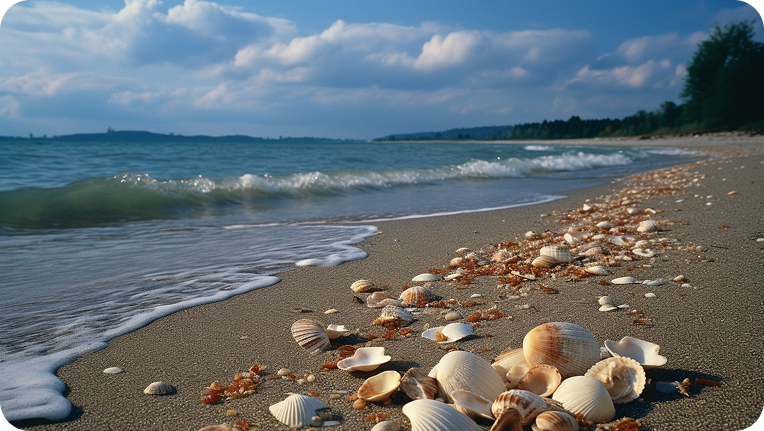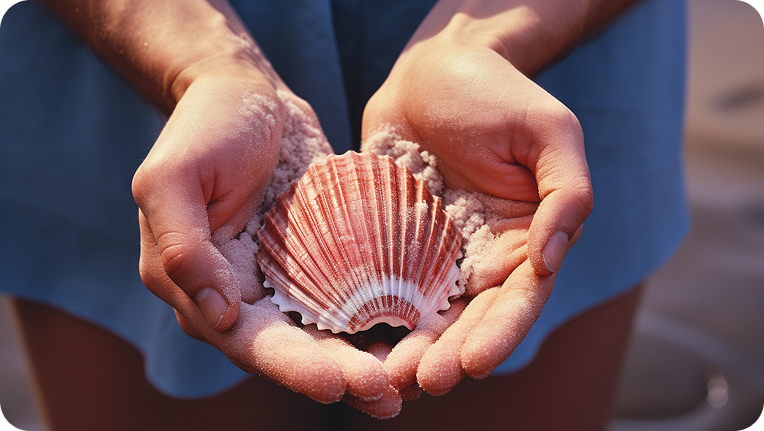Imagine an eternal resting place surrounded by the vastness
Imagine an eternal resting place surrounded by the vastness and tranquility of the ocean. For centuries, sea burials have captivated the human imagination, offering a unique and meaningful alternative to traditional land burials. In this blog post, we will explore the fascinating world of sea burials, delving into their history, benefits of burials by sea, and the various options available for those considering this ancient practice.
Key Takeaways
Key Takeaways
- Sea burials offer cost-effectiveness, environmental sustainability and a personalized experience compared to land burials.
- Individuals may choose a sea burial based on personal preference or connection to marine life/military service.
- Legal requirements and regulations must be followed when planning a sea burial ceremony, with options ranging from intimate gatherings to elaborate services.
Pledge today
Donec et odio pellentesque diam
Understanding Sea Burials
Understanding Sea Burials
Sea burials have deep historical roots, dating back to ancient times and appearing in various cultures’ lore. The practice involves committing human remains to the ocean, either through full body burial or scattering ashes at sea. Over time, sea burial services have evolved to accommodate a wide range of preferences and adhere to modern regulations.
Sea burial, also known as sea funeral, refers to the disposal of human remains in water, either through full body sea burial or scattering ashes. Both methods offer unique experiences and are governed by specific regulations, to be discussed below.
Full Body Sea Burial
A full body sea burial, also known as an ocean burial, involves:
- Placing the deceased in a biodegradable casket or shroud, which can also be considered as a burial cloth
- Lowering the casket or shroud into the ocean, following specific regulations set forth by authorities
- The vessel must travel at least three nautical miles from shore
- The vessel must reach a depth of 100 fathoms (600+ feet) before commencing the burial
- Only biodegradable materials can be placed in the water, prohibiting the use of plastics and metals.
Given the strict regulations and the specialized nature of full body sea burials, it is often necessary to engage a specialized charter company. Additionally, the Environmental Protection Agency (EPA) requires notification within thirty days of the burial or scattering event.
Scattering Ashes at Sea
Scattering ashes at sea is a more common method of sea burial, where cremated remains are dispersed into the ocean, often accompanied by a memorial service. This practice is also subject to regulations from the Environmental Protection Agency, as well as state and local laws.
A nearby funeral director can help in identifying a scattering service provider. After the sea burial, the charter company will typically provide a certificate indicating the precise coordinates of the deceased’s final resting place.
Advantages of Sea Burials Over Land Burials
Advantages of Sea Burials Over Land Burials

Opting for a sea burial over a traditional land burial presents several benefits, including cost-effectiveness, reduced environmental impact, and a unique, personalized experience.
The following sections offer a deeper analysis of these advantages.
Cost-Effectiveness
Sea burials are generally more affordable than land burials, with various packages available to suit different budgets. The cost of a sea burial permit is significantly lower than that of a burial plot, making it a more cost-effective option.
Sea burial service providers offer a variety of packages, accommodating a range of budgets. These may include simple ash scattering or elaborate ceremonies. No matter the package selected, sea burials typically present a more economical alternative to traditional land burials.
Environmental Impact

Sea burials are more environmentally friendly than land burials for several reasons:
- They use biodegradable materials, ensuring minimal environmental pollution.
- The body is returned to nature, allowing it to decompose naturally.
- Every item and object released into the ocean during a sea burial must be biodegradable, further reducing environmental impact.
A sea burial contributes to marine ecosystems by:
- Offering a natural and biodegradable resting place for the deceased
- Decomposing gradually, releasing essential nutrients into the water and bolstering the growth of marine organisms
- Creating artificial coral reefs, providing habitats for marine life and encouraging biodiversity
Unique and Personalized Experience
Sea burials offer a unique and personalized experience, allowing individuals to be laid to rest in the vastness of the ocean, surrounded by the beauty and tranquility of nature. The peaceful and serene final resting place provided by a sea burial cannot be matched by a traditional land burial.
Personalization options for sea burials include:
- Setting up a memory table
- Creating a stone station
- Displaying creative photos
- Delivering meaningful eulogies
- Incorporating personalized elements such as scattering flower petals or playing personalized music
Each sea burial is tailored to the specific desires and preferences of the family members and loved ones, ensuring a truly memorable and meaningful experience.
Who Can Choose a Sea Burial?
Who Can Choose a Sea Burial?

Anyone can choose a sea burial, whether due to a connection to marine life, being on a civilian vessel, military service, or simply personal preference.
The sections below examine the factors that may influence the decision to opt for a sea burial.
Connection to Marine Life or Military Service
Individuals with a strong connection to marine life or a history of military service may be particularly drawn to sea burials. For those connected to marine life, opting for a sea burial can significantly impact the conservation of marine habitats and contribute to the restoration of marine ecosystems.
Military service also plays a significant role in the decision for a sea burial. The Coast Guard and Navy have established programs that provide burial at sea for military personnel, dependents, and civilians. Burial at sea is regarded as a time-honored tradition and a highly esteemed option for the final resting place of sailors and Marines.
Personal Preference
Personal preference plays a significant role in choosing a sea burial, as some individuals may find the idea of returning to the ocean comforting and meaningful. Various factors can influence the preference for sea burials over traditional burials, such as cost, symbolism, and environmental concerns.
Cultural or spiritual beliefs may also impact personal preference for sea burials. In Hinduism, for example, sea burials are perceived as a way to return the deceased back to Mother Nature. It is essential to honor these beliefs and consult with religious leaders or experts in the specific faith or tradition when contemplating a sea burial.
Planning a Sea Burial Service
Planning a Sea Burial Service

Planning a sea burial service involves understanding legal requirements and regulations, as well as considering various funeral ceremony options.
The sections below provide insight into these aspects of planning a sea burial.
Legal Requirements and Regulations
Sea burials are subject to specific regulations set by authorities such as the EPA, and may require coordination with the Department of the Navy or U.S. Coast Guard for military-related services. The EPA regulations for sea burials are outlined in the Marine Protection, Research, and Sanctuaries Act (MPRSA) general permit, which mandates specific requirements for burial locations and materials.
For military-related sea burials, several documents are necessary to request a naval burial at sea, and the Department of the Navy or U.S. Coast Guard must be involved in the process. Comprehending and complying with these regulations is vital when planning a sea burial service.
Funeral Ceremony Options
Funeral ceremony options for sea burials can range from simple, intimate gatherings to more elaborate, customized services, depending on the preferences of the deceased and their family. Some options for sea burial ceremonies include:
- Scattering ashes by surfboard
- Scattering ashes by paddleboard
- Scattering ashes by kayak
- Scattering ashes by canoe
These options, including direct cremation, allow for customization and personalization of the ceremony to meet the specific needs and wishes of the deceased and their loved ones.
A more customized ceremony could involve:
- Personalizing the urn or container
- Scattering flower petals
- Playing music
- Reciting poems
- Sharing cherished memories
- Incorporating custom coordinates bracelets or nautical charts
The goal is to create a personalized, meaningful tribute that honors the memory of the deceased.
Summary
Summary
In conclusion, sea burials offer a unique and meaningful alternative to traditional land burials. With their rich history, cost-effectiveness, environmental benefits, and personalization options, sea burials provide a serene and tranquil final resting place for our loved ones. By understanding the various methods, regulations, and planning considerations, we can ensure an unforgettable and significant sea burial experience for those who choose this ancient and time-honored practice.
Frequently Asked Questions
Frequently Asked Questions
What are the advantages of burial at sea?
Burial at sea is an affordable and environmentally friendly option for those who wish to give their loved ones a respectful, peaceful farewell. It is open to all, regardless of profession or background.
Is burial at sea good for the environment?
Burials at sea can be a great way to save land and reduce environmental pollution, making it an environmentally friendly choice.
What are the main differences between a full body sea burial and scattering ashes at sea?
A full body sea burial involves placing the deceased in a biodegradable casket or shroud and lowering it into the ocean, whereas scattering ashes at sea involves dispersing cremated remains into the ocean. Regulations and memorial services accompany both methods.
Who is eligible for military-related sea burials?
Military personnel, their dependents, and civilians who meet specific criteria are eligible for military-related sea burials.
Can a sea burial ceremony be customized to include religious or spiritual elements?
Yes, a sea burial ceremony can be customized to include religious or spiritual elements such as prayers, eulogies and symbolic rituals. Religious leaders or experts in the specific faith should be consulted for a respectful ceremony.